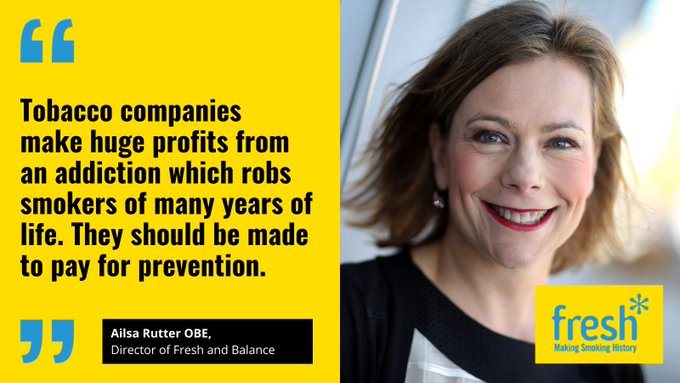Calls to make big tobacco pay as figures reveal iron link between smoking and poverty
Fresh is calling for tobacco companies to be forced to pay for the cost of preventing smoking after new figures highlight an iron link between smoking, poverty and ill health.
It comes as Cancer Research UK unveiled estimates that more than 27,000 cases of cancer a year in England are associated with poverty or deprivation – and with people living in more deprived areas 2.5 times more likely to smoke than those in least deprived areas, and finding it harder to quit. (1)
Factors blamed include exposure to cigarettes, tobacco industry targeting, housing and income pressures, access to health and social care, information and education. The study found that, of the 27,000 cases of cancer caused by deprivation, if smoking inequalities were removed and smoking rates were the same for everyone, around 5,500 of these cases could have been prevented each year in England.
Smoking accounts for over half of the difference in risk of premature death between social classes and death rates from tobacco are two to three times higher among disadvantaged social groups than among the better off. (2)
In the North East, smoking rates have fallen from 29% in 2005 to around 15.3% in 2019 but smoking still kills around 15 people a day, with more than 113,000 people in the North East killed by tobacco companies since the Millennium.
Ailsa Rutter OBE, Director of Fresh and Balance, whose own father died prematurely from smoking, said: “The fact is that smoking has accounted for more deaths than COVID-19 in the past year and over 113,000 people have died from tobacco since the start of the century. Like so many millions my own father got hooked onto smoking when he was still a child and never imagined how devastating this would ultimately be.
“It is sickening that tobacco companies are making billions in profits from addiction, misery and death while the NHS and local authorities pay for the damage.
“We need action – here in the North East we have high levels of public support for measures like making tobacco manufacturers pay a levy to Government for measures to help smokers quit and prevent young people from taking up smoking, and raising the age of sale to 21.”

The Government has set a goal of England becoming smoke-free by 2030, but CRUK say the most deprived groups are not on track to achieve this goal until the mid-2040s, while the least deprived are expected to achieve it in 2025.
The All Party Parliamentary Group (APPG) on Smoking and Health has recently called on the Government to include a set of tough new measures in its forthcoming Tobacco Control Plan, including:
- Funding for measures to reduce smoking and support people to quit be secured through a ‘polluter pays’ amendment to the Health and Social Care Bill, forcing tobacco manufacturers to pay.
- Targeted investment to reduce high smoking rates in communities where smoking does most damage, including social housing tenants, pregnant women and people with a mental health condition.
- Tough new regulations to protect children and young people from becoming smokers and help smokers quit including consulting to raise the age of sale of tobacco from 18 to 21.
Ex-smoker Sue Mountain, from South Tyneside underwent laser treatment in 2012 after a biopsy revealed she had laryngeal cancer. The cancer returned in 2017 which required radiotherapy every day for four weeks.
Sue said: “As a former smoker and cancer survivor, I have personal experience of the heartbreak that smoking can cause. I started smoking when I was a kid, before I realised how addictive it was. I don’t want my grandchildren to go through what I went through; I want them to grow up in a world where smoking is a thing of the past.
“I’m one of the lucky ones, fortunately I have been given the all-clear from cancer. Smoking makes life a misery for many thousands of people who suffer from debilitating diseases before it kills them. It’s shocking that tobacco companies are making massive profits from an addiction that robs people of their lives and their health. I believe they need to pay for the damage they do.”
Read the report on Cancer Research UK’s website
References
2: https://ash.org.uk/category/information-and-resources/health-inequalities/
